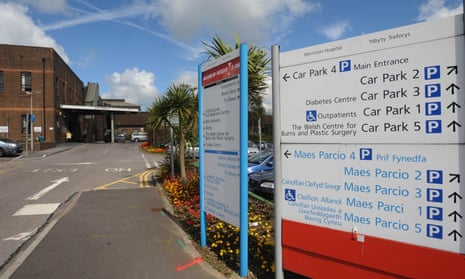The UK’s first solar farm owned by a health board and linked directly to a hospital has exceeded expectations by, at times, providing all the electricity needed to run the site, even during the winter months.
Health chiefs and Welsh government ministers had hoped the solar farm in south-west Wales would supply Morriston hospital in Swansea with a fifth of its energy consumption every year.
However, they were surprised and pleased that the Brynwhilach Farm, which is linked to Morriston by a two-mile cable, provided enough energy over one 50-hour period to meet 100% of the hospital’s demands.
It is estimated that the 10,000-panel farm, which was switched on in November, has already saved £120,000 in electricity bills, and the board has on occasions been able to sell power back to the energy grid.
The £5.7m solar farm was built under a loan scheme set up by the Welsh government to decarbonise the public sector by 2030.
The Welsh minister for climate change, Julie James, said: “We want our energy to come from community-owned and locally run renewable energy sources in Wales.
“This will ensure our supply is resilient, reliable and reasonable for both our planet and our pockets. Morriston hospital, which depends not only on the powers of its staff but also the energy-hungry machines to keep their patients alive and well, has blazed the trail.”
It had been thought that when it was fully operational the scheme would cut carbon emissions by 1,000 tonnes and save £500,000 in bills annually, but with world energy prices spiralling, the board now believes the savings could be almost double that figure.
Swansea Bay University health board’s assistant director of operations, Des Keighan, said: “It was expected that over the winter months the solar farm would contribute electricity, but that the hospital would still need to continue to buy power from the grid every day.
“What has come as a pleasant surprise is that for a total of 50 hours, the hospital has been entirely powered by the solar farm.
“This is despite the fact that the solar farm hasn’t been operating continually over the winter. It has still been undergoing tests and fine-tuning, and is not due to be completely finished until the end of March. So this additional performance has been even more of a bonus.”
